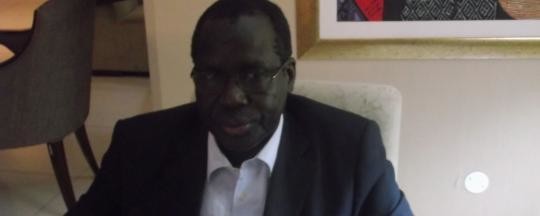The spokesperson of the Former Detainees group on Wednesday called for the criminalization of hate speech in order to promote peace in South Sudan.
Speaking at a public debate in Juba on the role of politicians in making peace organized by the Ebony Center, John Luk said that there is too much hate speech on the state-run South Sudan Television (SSTV) station.
“If you watch the South Sudan TV sometimes and you’re passionate about peace and reconciliation, you can switch it off because it is not the language that you want hear about peace,” Luk said.
“President Kiir will say you’re welcome, we welcome you our brothers and sisters and all that, [but] the next time you open the TV you see something else and you wonder why,” he added. “I think we need to talk to each other about this because it is not the language you want to hear about peace.”
“Our attitudes should be that of national reconciliation,” continued Luk, who is a former minister of justice. “We should use all that we have whether it is the media or whatever to preach national reconciliation, love among ourselves, and not the opposite.”
“Even hate speeches should be criminalized and those who continue to preach division and disharmony I think they should be talked to,” he said.
Luk said other factors hindering the peace process include the lack of political will and persistent opposition by some political elites to achieving peace. He said some leaders in South Sudan’s current government are hostile and violent against the agreement due to fear of losing positions.
“Let us put our country first before the positions that people get,” Luk said. “I heard the president talk about that the other time that if it means the people losing positions, let it be.”
Transitional government ‘urgent’
Luk said people should change their attitudes toward foreign countries attached to the peace agreement, hinting that if South Sudan’s leaders do not implement peace the country could become isolated.
“South Sudan leaders must show their full commitment to peace and being seen to be leading by providing the way by their actions and deeds because any failure to implement the peace agreement will fall squarely on their shoulders,” he said. “They must provide the needed political will. The government and SPLM-IO have to quickly resolve the issue of coming of the SPLM-IO to Juba and end their unnecessary media debate’’
The Former Detainees leader said the national constitution amendment committee should be immediately convened in Juba to make the necessary amendments to the transitional constitution to incorporate the peace agreement. He said forming a transitional government of national unity is an “urgent necessity” that will signify that the warring parties are now working together to make peace.
He said all pending controversial constitutional issues be put aside for the transitional government of national unity to address. Luk said the agreement gives the people of South Sudan the opportunity to make their own constitution and talk about the type of government and the number of states they want.
‘Guns must be silent’
The Former Detainees leader decried continued violence and the militarization of South Sudan’s communities.
“This violence is uncalled for, completely uncalled for, because it is the common people who are suffering and therefore whether you take a town what will you be doing with the town?” he posed. “Guns must be silent so that work is done to our people. The little peace that they want let them have it. Why should we negotiate about positions, about not coming?”
Luk called on all the monitor of the ceasefire to come to the ground and carry out their work to stop ongoing violations and continued loss of life.
Other particpants in the debate included Lam Akol and Martin Elia Lomuro.




